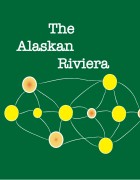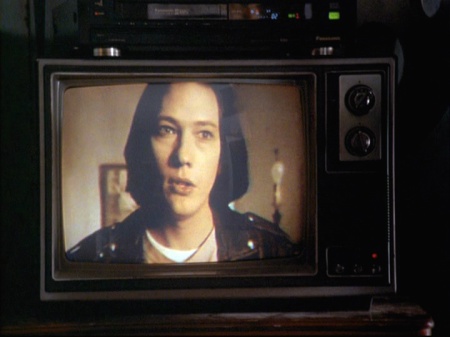Episode: 4.12
Title: Revelations
Written by: Diane Frolov and Andrew Schneider
Directed by: Daniel Attias
Aired: January 11, 1993.
Log line: Chris takes his vacation at a monastery; Ruth-Anne pays Maurice the remaining amount owed on her store; Joel becomes incredibly antsy when he has no patients.
Listen to the podcast discussion of the episode here.
In “Revelations,” both Chris and Joel contemplate the idea of stillness and silence. Strangely enough, both characters have the same problem of not being able to stand it (although Chris is drawn to it while Joel is utterly horrified by the thought of stillness). Meanwhile, Ed finds himself torn between his two benefactors and employers, and is forced in a position to choose between them.
As we were rewatching this episode, something struck us, and we noticed that there were a number of scenes where identical things were featured.
Chris goes to a monastery where monks are dressed in identical robes, where hoods and bee-keeping masks hide their individuality. Most comically, he keeps mistaking Brother James for Brother Simon.
Bees, of course, are identical to one another (to our eyes, at least).
Likewise, Maurice mistakes Bernard for Chris.
Meanwhile, we see sameness get visually represented in a few other scenes. For example, Joel with the walnuts (who knows why he’s opening up row upon row of walnuts, but I guess he is very bored).
We see two identical rackets in the background of Maurice’s gym.
We also see two oars hanging at Ruth-Anne’s store, nicely paralleling the two characters of Maurice and Ruth-Anne.
In one scene, Joel is throwing around playing cards:
Marilyn contemplates paperclips, which are indistinguishable from one another.
Even some of the dialogue is identical:
A couple of Joel and Marilyn scenes are set up nearly identically:
Of course, there is Ed’s Parent Trap inspired twin plot.
Ed creates his own twin through the movie camera while Joel is prompted to look into his own reflection to see nothing:
We also have the battle between “Apache Tan” and “Desert Sage.” Both colours look pretty much identical, but to Ruth-Anne and Maurice there is a world of difference.
Finally Chris meets his other self, Brother Simon who he is strangely attracted to, his silence to his speech, and is not only blown away by finding out Simon is a woman, but by finding out that she is another “Chris” when he asks her Christian name.
Why this theme? This episode has a lot to do with sameness and difference. What looks identical to most people are very distinct for some others (like the difference between the paint colours “Apache Tan” and “Desert Sage”). This idea of the identical vs. individual is similar to how we approach people; at first strangers can be indistinguishable from one another, but once you get to know them, they become separate individuals, as different as from one another as can be.
The idea also makes us think about Chris, who expected one kind of revelation from his male-only monastic experience but ends up being utterly surprised when “a divine hand [belonging to a woman] reached down grabbed me by the belt strap and gave me a hard yank.” Somehow we like the idea that a revelation can emerge from sameness, the possibility that amidst all the beige we suddenly find a brightness that was once hidden.
Songs from the episode’s original airing:
- Glenn Miller, “Moonlight Serenade“
Maurice asks Bernard for advice about Ruth-Anne paying off the store. - Judy Collins, “Bird on a Wire“
[replaced in DVD version]
Joel and Bernard talk about the rush of the ER and tax day. - Bellamy Brothers, “Cowboy Beat“
[replaced in DVD version]
Ed and Shelly talk about the fight between Maurice and Ruth-Anne. - Bob Dylan, “Just Like a Woman“
[note: the original airing had a David Schwartz (?) piano instrumental version of this song, which was replaced on the DVD version]
Final scene of Chris on the radio, talking about his vacation and playing tribute to women.
Themes / Recurrences: Identity; men/women; ownership; silence/stillness; life
The Good: We love this episode – every story line works. We particularly are fond of Rob Morrow’s performance in this episode, as he displays quite a darling fidgetiness. John Corbett is of course a star in this episode.
The Bad: There is nothing bad about this episode, except for the fact that this episode made us (well, On in particular) cringe with secondhand embarrassment. Many of the Chris scenes just made us (well, On) cover our eyes with our hands because of its awkwardness.
The Notable: We love the episode’s inclusion of the Judy Collins’ cover of “Bird on a Wire” in the original airing (it’s one of our favourite songs, and it’s written by legendary Canadian Leonard Cohen).
On’s rating: 9 out of 10.
Shane’s rating: 10 out of 10.
























